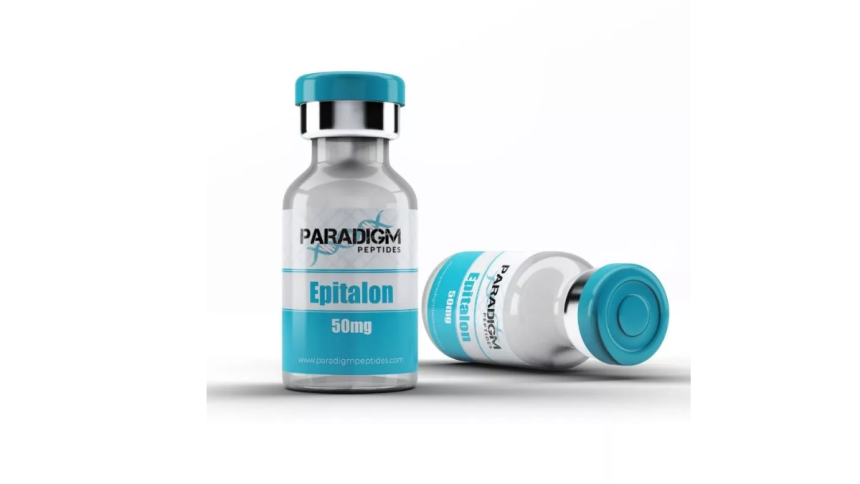Introduction To Epitalon
Epitalon is one of the peptides utilised and studied for its impressive anti-aging effects. It has been proven to be a powerful antioxidant that can be compared to melatonin, which may grant longevity benefits.
– What Is Epitalon?
Epitalon is described as a “synthetic peptide” made up of amino acids. These include glycine, aspartic acid, glutamic acid, and alanine. Epitalon mimics a natural peptide known as epithalamin (extracted from the pineal gland in humans and animals). Vladimir Khavinson, a Russian gerontologist and professor, synthesized this peptide. His research was based on peptide preparation development used for restoring function in different organs to reverse and prevent the process of aging. Vladimir Khavinson is also the Director of the Saint Petersburg Institute of Bioregulation and Gerontology.
Khavinsom first extracted Epithalamin from calves. However, due to inherent limitations in association with production, he decided to formulate a synthetic peptide known as Epitalon.
– How Is Epitalon Used?
Epitalon is typically administered via intramuscular or intravenous injections or through the skin (transdermally). This is because peptides break down once they reach the digestive tract, which means they cannot effectively enter the bloodstream in order to exert their capabilities, intact.
Even though a few results look promising, the majority of the studies have been performed in cells and animals, which means that the safety profile and potential health advantages of Epitalon remain largely unresearched.
– What Does The Research Show For Epitalon?
Cell And Animal Research (Lack Of Evidence)
To date, none of the clinical evidence actually supports Epitalon use for any condition that is listed below. The information to follow is a brief summary of existing cell-based and animal research, which should promote further efforts for investigation. However, it is of importance to know that all the studies listed in this article, shouldn’t be thought of as supportive when it comes to any of the health benefits that are described or mentioned.
• Correcting Circadian Rhythms
As people start to age, their circadian rhythms are less pronounced and become disrupted, which coincides with a decrease in altered sleeping cycles and a decrease in melatonin secretion. In a trial conducted on 14 elderly people, Epitalon was shown to improve the production of melatonin and changed its peak and cycle concentration to resemble that of younger people.
• Increasing Lifespan
According to PubMed Journals, when this Epitalon was used in fruit flies in their larval stage, the lifespan average of the fruit flies was increased by 11-16%.
In another study conducted on rats, the research involved exposing the rodents to equal amounts of darkness and light, varying amounts of darkness and light, or permanent illumination. Epitalon increased the maximal lifespan in every group by 68 days for the equal amounts of darkness and light group, 95 days for the varying amounts of darkness and light, and 24 days for the permanent illumination group.
In mice diagnosed with high blood pressure, Epitalon injections didn’t have an effect on the average lifespan of the mice, yet it did increase the maximal lifespan to 12.3% (https://pubmed.ncbi.nlm.nih.gov/14501183/).
Cell-based studies discovered that Epitalon also boosts telomerase activity. This is an enzyme that adds extra nucleotides to protective sequences (at the end of chromosomes), which allows the cells to not only divide but to also grow for a lot longer.
• Increased Enzyme Activity
Pancreatic enzymes appear to decrease in older individuals. In both old and young rats, Epitalon boosted the activity of the enzymes responsible for digesting sugar and protein, with these effects being more evident in the older group of rats.
Another study discovered that Epitalon increased enzyme activities in the aged rat’s small intestine.
• Cancer
According to PubMed.gov, when Epitalon was administered in rats that had colon cancer, this peptide raised lymph flow (containing white blood cells) and apoptosis (programmed cell death), while also slowing down cancer growth.
In mice that had mammary tumors, this peptide dramatically lowered the mice numbers with several tumors, while decreasing the size of the tumors when compared to the group of control mice. The researchers in this study also discovered that peptides lowered certain gene expressions that, if over-activated, play a major role in breast cancer development in both humans and mice.
Another study involving mice discovered that treatments involving Epitalon lowered the mice numbers with cancerous tumors and stopped cancer from moving to other locations in their bodies (metastasizing) in all of the mice that were treated.
• Antioxidant Status
Oxidative stress occurs if the body is deficient in the antioxidants that counteract the effects of damaging molecules (free radicals) that have missing electrons, which plays a primary role in various diseases, including cancer, heart disease, diabetes, and neurogenerative diseases like Parkinson’s disease and Alzheimer’s
Melatonin is among the most powerful antioxidants that the human body produces. The antioxidant effects of Epitalon are believed to be caused by its capability to stimulate the production of melatonin and various other mechanisms in addition to the actions of melatonin.
In a study conducted on male rats, Epitalon increased the capacity of total antioxidants by 36% and SOD (superoxide dismutase) a potent endogenous antioxidant by 19%. When incubating epithalamin with the blood extracted from patients with breast cancer, they displayed an increase in the activity of the antioxidant enzymes along with antioxidative vitamin levels.
Takeaways
Even though some of the preclinical studies and research on Epitalon appear promising, a lot more research is required in diseased and healthy individuals. Epitalon is currently not FDA-approved but has been made available in over-the-counter supplements. It is advisable to first consult with a doctor before taking Epitalon or any other type of supplement, especially when the product still requires more research.
Lynn Martelli is an editor at Readability. She received her MFA in Creative Writing from Antioch University and has worked as an editor for over 10 years. Lynn has edited a wide variety of books, including fiction, non-fiction, memoirs, and more. In her free time, Lynn enjoys reading, writing, and spending time with her family and friends.















